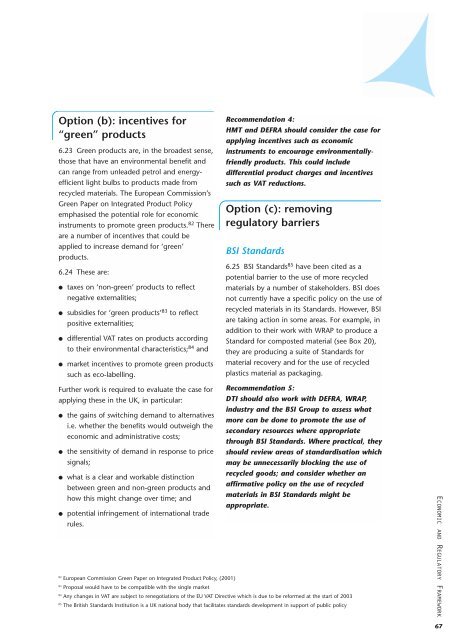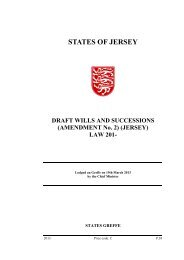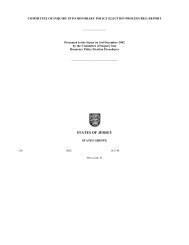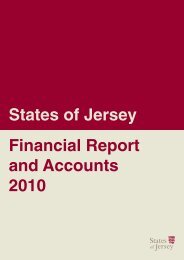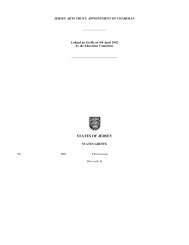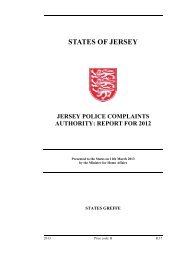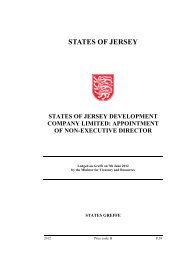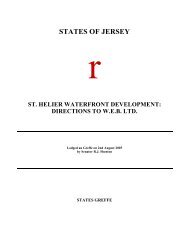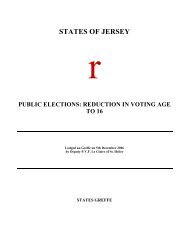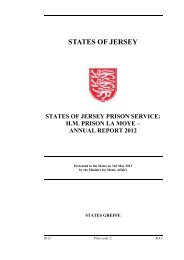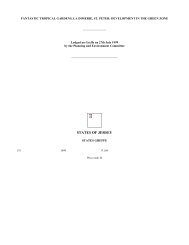Waste not want not - States Assembly
Waste not want not - States Assembly
Waste not want not - States Assembly
You also want an ePaper? Increase the reach of your titles
YUMPU automatically turns print PDFs into web optimized ePapers that Google loves.
Option (b): incentives for<br />
“green” products<br />
6.23 Green products are, in the broadest sense,<br />
those that have an environmental benefit and<br />
can range from unleaded petrol and energyefficient<br />
light bulbs to products made from<br />
recycled materials. The European Commission’s<br />
Green Paper on Integrated Product Policy<br />
emphasised the potential role for economic<br />
instruments to promote green products. 82 There<br />
are a number of incentives that could be<br />
applied to increase demand for ‘green’<br />
products.<br />
6.24 These are:<br />
●<br />
●<br />
●<br />
●<br />
taxes on ‘non-green’ products to reflect<br />
negative externalities;<br />
subsidies for ‘green products’ 83 to reflect<br />
positive externalities;<br />
differential VAT rates on products according<br />
to their environmental characteristics; 84 and<br />
market incentives to promote green products<br />
such as eco-labelling.<br />
Recommendation 4:<br />
HMT and DEFRA should consider the case for<br />
applying incentives such as economic<br />
instruments to encourage environmentallyfriendly<br />
products. This could include<br />
differential product charges and incentives<br />
such as VAT reductions.<br />
Option (c): removing<br />
regulatory barriers<br />
BSI Standards<br />
6.25 BSI Standards 85 have been cited as a<br />
potential barrier to the use of more recycled<br />
materials by a number of stakeholders. BSI does<br />
<strong>not</strong> currently have a specific policy on the use of<br />
recycled materials in its Standards. However, BSI<br />
are taking action in some areas. For example, in<br />
addition to their work with WRAP to produce a<br />
Standard for composted material (see Box 20),<br />
they are producing a suite of Standards for<br />
material recovery and for the use of recycled<br />
plastics material as packaging.<br />
Further work is required to evaluate the case for<br />
applying these in the UK, in particular:<br />
Recommendation 5:<br />
DTI should also work with DEFRA, WRAP,<br />
industry and the BSI Group to assess what<br />
● the gains of switching demand to alternatives<br />
more can be done to promote the use of<br />
i.e. whether the benefits would outweigh the<br />
secondary resources where appropriate<br />
economic and administrative costs;<br />
through BSI Standards. Where practical, they<br />
● the sensitivity of demand in response to price<br />
signals;<br />
should review areas of standardisation which<br />
may be unnecessarily blocking the use of<br />
recycled goods; and consider whether an<br />
● what is a clear and workable distinction<br />
affirmative policy on the use of recycled<br />
between green and non-green products and<br />
materials in BSI Standards might be<br />
how this might change over time; and<br />
appropriate.<br />
● potential infringement of international trade<br />
rules.<br />
82<br />
European Commission Green Paper on Integrated Product Policy, (2001)<br />
83<br />
Proposal would have to be compatible with the single market<br />
84<br />
Any changes in VAT are subject to renegotiations of the EU VAT Directive which is due to be reformed at the start of 2003<br />
85<br />
The British Standards Institution is a UK national body that facilitates standards development in support of public policy<br />
ECONOMIC AND REGULATORY FRAMEWORK<br />
67


